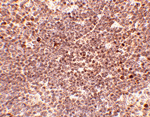Movement of lymphocytes through lymphoid organs is required for generating immunity. Their migration into lymph nodes follows a series of events including integrin activation through chemokine signaling, adhesion and diapedis. The release of lymphocytes from lymph nodes is regulated by the phospholipid sphingosine-1-phosphate (S1P). One of its receptors S1P1 binds S1P with high specificity and affinity; agonism of this receptor by the immunosuppressive agent FTY720 inhibits the entry of tissue T cells into afferent lymphatics in homeostatic and inflammatory conditions. Recent experiments have indicated that CCR7-deficient T cells left lymph nodes more rapidly than wild-type cells did and these cells where also less effectively retained after treatment with FTY720, and that egress competence could be restored by inactivating G alpha i-protein-coupled receptor signaling. These results suggest that S1P1 acts in the lymphocyte to promote lymph node egress by overcoming retention signals mediated by CCR7 and G alpha i-protein-coupled receptor signaling.


